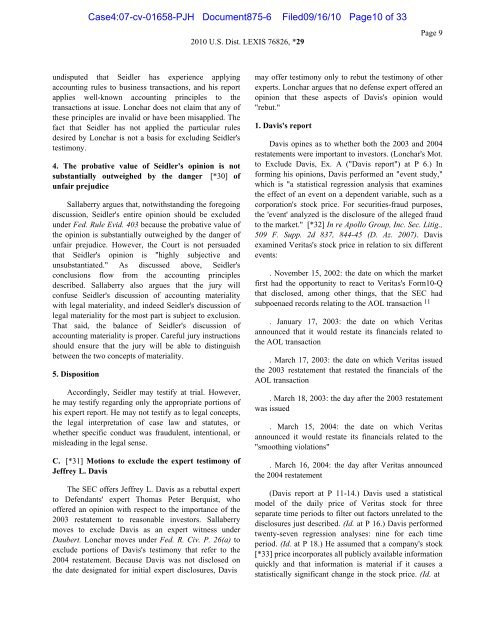exhibit 2 - SAP Lawsuit Portal
exhibit 2 - SAP Lawsuit Portal
exhibit 2 - SAP Lawsuit Portal
You also want an ePaper? Increase the reach of your titles
YUMPU automatically turns print PDFs into web optimized ePapers that Google loves.
undisputed that Seidler has experience applying<br />
accounting rules to business transactions, and his report<br />
applies well-known accounting principles to the<br />
transactions at issue. Lonchar does not claim that any of<br />
these principles are invalid or have been misapplied. The<br />
fact that Seidler has not applied the particular rules<br />
desired by Lonchar is not a basis for excluding Seidler's<br />
testimony.<br />
4. The probative value of Seidler's opinion is not<br />
substantially outweighed by the danger [*30] of<br />
unfair prejudice<br />
Sallaberry argues that, notwithstanding the foregoing<br />
discussion, Seidler's entire opinion should be excluded<br />
under Fed. Rule Evid. 403 because the probative value of<br />
the opinion is substantially outweighed by the danger of<br />
unfair prejudice. However, the Court is not persuaded<br />
that Seidler's opinion is "highly subjective and<br />
unsubstantiated." As discussed above, Seidler's<br />
conclusions flow from the accounting principles<br />
described. Sallaberry also argues that the jury will<br />
confuse Seidler's discussion of accounting materiality<br />
with legal materiality, and indeed Seidler's discussion of<br />
legal materiality for the most part is subject to exclusion.<br />
That said, the balance of Seidler's discussion of<br />
accounting materiality is proper. Careful jury instructions<br />
should ensure that the jury will be able to distinguish<br />
between the two concepts of materiality.<br />
5. Disposition<br />
Case4:07-cv-01658-PJH Document875-6 Filed09/16/10 Page10 of 33<br />
Accordingly, Seidler may testify at trial. However,<br />
he may testify regarding only the appropriate portions of<br />
his expert report. He may not testify as to legal concepts,<br />
the legal interpretation of case law and statutes, or<br />
whether specific conduct was fraudulent, intentional, or<br />
misleading in the legal sense.<br />
C. [*31] Motions to exclude the expert testimony of<br />
Jeffrey L. Davis<br />
The SEC offers Jeffrey L. Davis as a rebuttal expert<br />
to Defendants' expert Thomas Peter Berquist, who<br />
offered an opinion with respect to the importance of the<br />
2003 restatement to reasonable investors. Sallaberry<br />
moves to exclude Davis as an expert witness under<br />
Daubert. Lonchar moves under Fed. R. Civ. P. 26(a) to<br />
exclude portions of Davis's testimony that refer to the<br />
2004 restatement. Because Davis was not disclosed on<br />
the date designated for initial expert disclosures, Davis<br />
2010 U.S. Dist. LEXIS 76826, *29<br />
may offer testimony only to rebut the testimony of other<br />
experts. Lonchar argues that no defense expert offered an<br />
opinion that these aspects of Davis's opinion would<br />
"rebut."<br />
1. Davis's report<br />
Page 9<br />
Davis opines as to whether both the 2003 and 2004<br />
restatements were important to investors. (Lonchar's Mot.<br />
to Exclude Davis, Ex. A ("Davis report") at P 6.) In<br />
forming his opinions, Davis performed an "event study,"<br />
which is "a statistical regression analysis that examines<br />
the effect of an event on a dependent variable, such as a<br />
corporation's stock price. For securities-fraud purposes,<br />
the 'event' analyzed is the disclosure of the alleged fraud<br />
to the market." [*32] In re Apollo Group, Inc. Sec. Litig.,<br />
509 F. Supp. 2d 837, 844-45 (D. Az. 2007). Davis<br />
examined Veritas's stock price in relation to six different<br />
events:<br />
. November 15, 2002: the date on which the market<br />
first had the opportunity to react to Veritas's Form10-Q<br />
that disclosed, among other things, that the SEC had<br />
subpoenaed records relating to the AOL transaction 11<br />
. January 17, 2003: the date on which Veritas<br />
announced that it would restate its financials related to<br />
the AOL transaction<br />
. March 17, 2003: the date on which Veritas issued<br />
the 2003 restatement that restated the financials of the<br />
AOL transaction<br />
. March 18, 2003: the day after the 2003 restatement<br />
was issued<br />
. March 15, 2004: the date on which Veritas<br />
announced it would restate its financials related to the<br />
"smoothing violations"<br />
. March 16, 2004: the day after Veritas announced<br />
the 2004 restatement<br />
(Davis report at P 11-14.) Davis used a statistical<br />
model of the daily price of Veritas stock for three<br />
separate time periods to filter out factors unrelated to the<br />
disclosures just described. (Id. at P 16.) Davis performed<br />
twenty-seven regression analyses: nine for each time<br />
period. (Id. at P 18.) He assumed that a company's stock<br />
[*33] price incorporates all publicly available information<br />
quickly and that information is material if it causes a<br />
statistically significant change in the stock price. (Id. at


